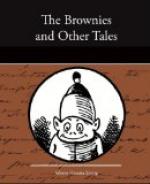Over his head, through immeasurable distances, the dark blue space was lighted by the great multitude of the stars, whose glittering ranks have in that atmosphere a distinctness and a glory unseen with us. Perhaps no scene of beauty in the visible creation has proved a more hackneyed theme for the poet and the philosopher than a starry night. But not all the superabundance of simile and moral illustration with which the subject has been loaded can rob the beholder of the freshness of its grandeur or the force of its teaching; that noblest and most majestic vision of the handiwork of GOD on which the eye of man is here permitted to rest.
As the parson gazed he became conscious that he was not alone. Other eyes besides his were watching the skies to-night. Dark, profound, patient, Eastern eyes, used from the cradle to the grave to watch and wait. The eyes of star-gazers and dream-interpreters; men who believed the fate of empires to be written in shining characters on the face of heaven, as the “Mene, Mene,” was written in fire on the walls of the Babylonian palace. The old parson was one of the many men of real learning and wide reading who pursue their studies in the quiet country parishes of England, and it was with the keen interest of intelligence that he watched the group of figures that lay near him.
“Is this a vision of the past?” he asked himself. “There can be no doubt as to these men. They are star-gazers, magi, and, from their dress and bearing, men of high rank; perhaps ’teachers of a higher wisdom’ in one of the purest philosophies of the old heathen world. When one thinks,” he pursued, “of the intense interest, the eager excitement which the student of history finds in the narrative of the past as unfolded in dusty records written by the hand of man, one may realize how absorbing must have been that science which professed to unveil the future, and to display to the eyes of the wise the fate of dynasties written with the finger of GOD amid the stars.”
The dark-robed figures were so still that they might almost have been carved in stone. The air seemed to grow purer and purer; the stars shone brighter and brighter; suspended in ether the planets seemed to hang like lamps. Now a shooting meteor passed athwart the sky, and vanished behind the hill. But not for this did the watchers move; in silence they watched on—till, on a sudden, how and whence the parson knew not, across the shining ranks of that immeasurable host, whose names and number are known to GOD alone, there passed in slow but obvious motion one brilliant solitary star—a star of such surpassing brightness that he involuntarily joined in the wild cry of joy and greeting with which the Men of the East now prostrated themselves with their faces to the earth. He could not understand the language in which, with noisy clamour and gesticulation, they broke their former profound and patient silence, and greeted the portent for which they had watched. But he knew now that these were the Wise Men of the Epiphany, and that this was the Star of Bethlehem. In his ears rang the energetic simplicity of the Gospel narrative, “When they saw the Star, they rejoiced with exceeding great joy.”




